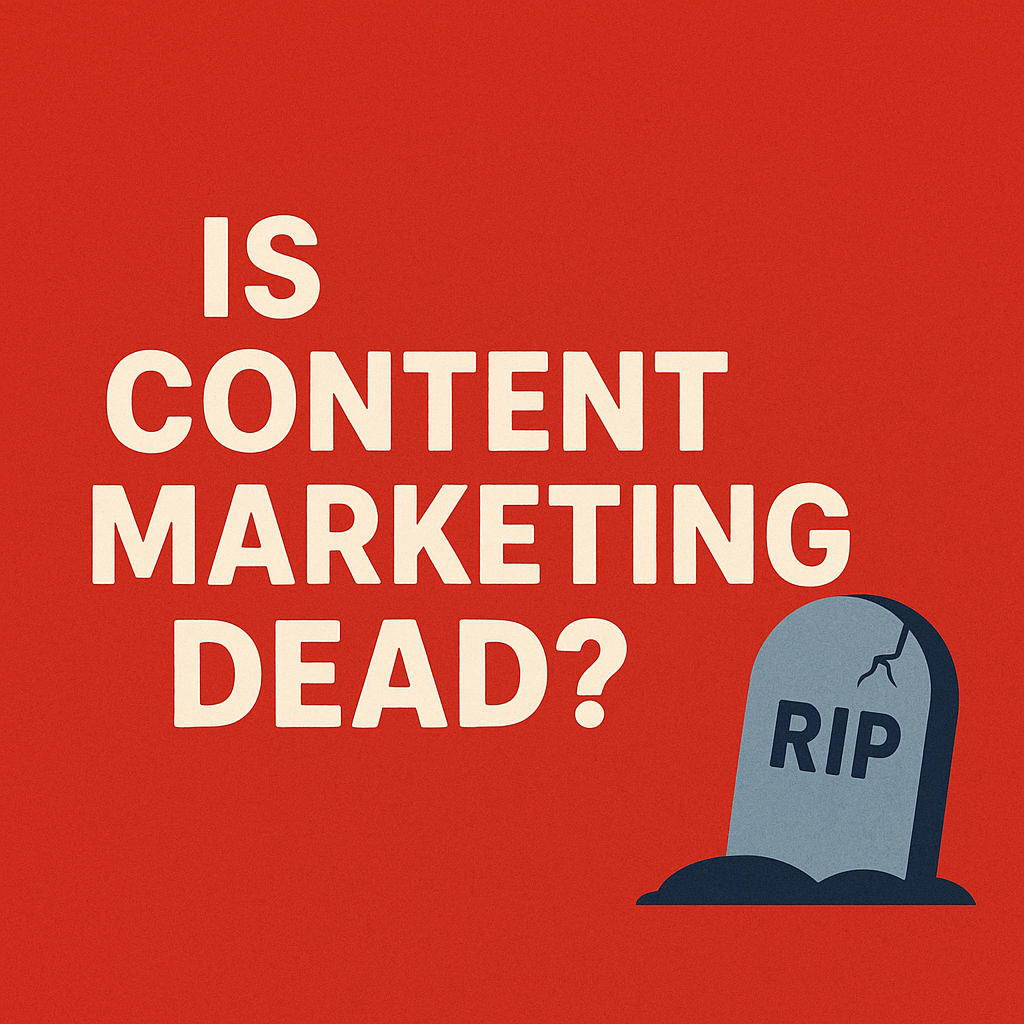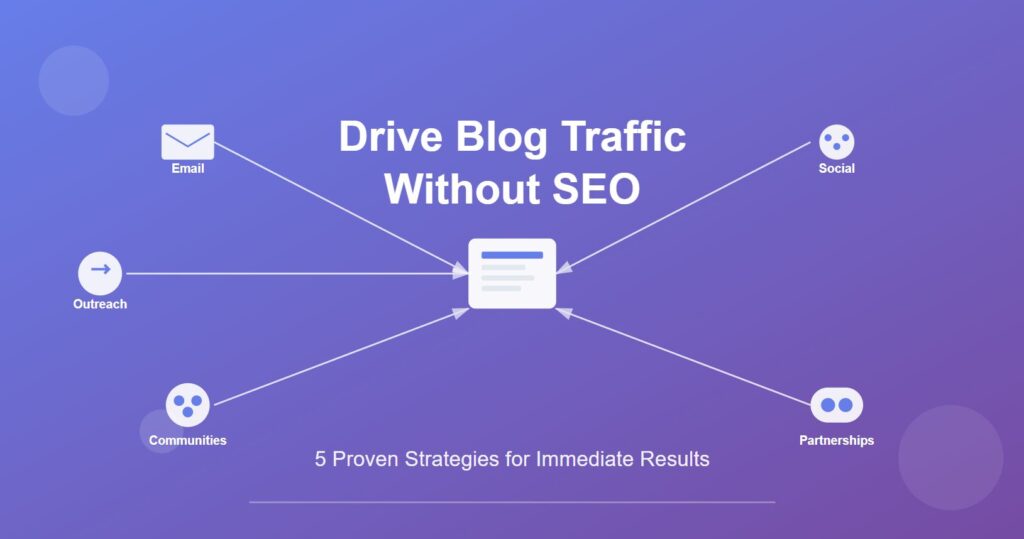TL;DR: Despite AI disruption fears and recent layoffs, content marketing careers are evolving rather than disappearing. Most roles now incorporate AI as a productivity tool, salaries remain competitive at $60K-$115K+, and demand persists across industries—with success requiring strategic thinking and specialized expertise beyond basic content creation.
The digital marketing world loves a good obituary. Over the past few years, we’ve heard proclamations about the “death of content marketing,” the “end of the blog era,” and predictions that AI would make content creators obsolete by 2025. Yet here we are, and content marketing professionals are busier than ever.
If you’ve been worried about the future of content marketing careers, or if you’re considering entering this field but concerned about its longevity, this analysis will provide clarity. Despite technological disruptions and market shifts, content marketing isn’t dying—it’s evolving into something more sophisticated, strategic, and valuable than ever before.
The reality is that while the landscape has changed dramatically, the fundamental human need for authentic, valuable content remains constant. What’s different is how we create, distribute, and measure that content.
The Current State of Content Marketing Employment
Content marketing employment presents a mixed picture in 2025. While one in three marketers report their company laid off marketing employees in the last 12 months, and 68% believe finding a marketing job is more challenging than five years ago, the industry remains fundamentally healthy.
The Job Market Reality
According to the Content Marketing Institute’s 2025 research, 76% of marketers report being either somewhat or very satisfied in their roles. More encouraging still, 82% of marketers actively invest in content marketing as a core business strategy, and worldwide content marketing revenue is projected to reach $107.5 billion by 2026.
High-demand specializations include:
- Content strategists who develop comprehensive content ecosystems
- Video content creators and editors (short-form video shows the highest ROI for 21% of marketers)
- SEO content specialists (78% of B2B marketers employ keyword research while creating content)
- Brand storytelling experts who maintain voice consistency across platforms
- Content performance analysts who measure ROI and optimization
- AI-fluent content professionals who can leverage tools strategically
Salary Landscape
Compensation for content marketing roles remains competitive, though it varies significantly by experience, location, and specialization:
Entry-level positions (0-2 years):
- Content Marketer: $47,500-$60,000
- Content Marketing Specialist: $45,000-$59,500
Mid-level roles (3-5 years):
- Content Marketing Manager: $68,900-$87,000
- Content Strategist: $68,677 average
Senior-level positions (6+ years):
- Senior Content Marketing Manager: $112,666 average
- Director of Content Marketing: $210,089 average
According to Superpath’s 2025 salary data, the average content marketer earns $93,522, up 9% from the previous year. Notably, freelance content marketers make more on average than full-time employees ($121,224 vs. $108,824).
Geographic variations remain significant:
- Major metro areas (San Francisco, New York, Boston) pay 15-30% higher than smaller markets
- Remote work has democratized access to high-paying positions regardless of location
Why AI Enhanced Rather Than Replaced Content Careers
The introduction of advanced AI tools in 2024 and 2025 sparked fears about job displacement. A sobering 81.6% of digital marketers fear being replaced by AI, and jobs for digital marketing content writers are projected to decline by 50% by 2030.
However, the immediate reality has been more nuanced than these projections suggest.
AI’s Actual Impact
Research from Microsoft analyzing 200,000 workplace conversations found that while sales and marketing roles rank among the most impacted by AI, the technology serves as a “helper” rather than a replacement. Critically, only 3% of marketing teams have replaced employees with AI tools.
According to HubSpot’s 2024 research:
- 68% of marketing leaders reported ROI on AI investment
- 75% use AI to reduce manual task time
- 86% save 1+ hours daily by streamlining creative tasks
The Content Marketing Institute reports that 89% of marketers use generative AI tools, but primarily as efficiency enhancers rather than replacements.
What AI Does Well (And What It Doesn’t)
AI excels at:
- Basic research and data gathering
- Initial draft creation and ideation
- Data analysis and pattern recognition
- Repetitive content tasks
AI struggles with:
- Strategic positioning and brand alignment
- Nuanced audience understanding
- Emotional intelligence and connection
- Creative problem-solving that requires context
- Cross-functional business strategy
Smart content marketers have embraced AI as a collaborative partner, using it for efficiency while applying human expertise for strategic elements that drive business results.
The New Skills In Demand
Three in four marketers say they need to master specialized or niche skills to remain relevant in the face of AI. The World Economic Forum reports that 4 in 5 employers now prioritize hiring AI-skilled talent, yet 75% struggle to find it.
Critical skills for 2025 and beyond:
- AI tool proficiency and strategic prompt engineering
- Content strategy and editorial oversight
- Brand voice development and consistency
- Audience psychology and emotional intelligence
- Cross-platform content adaptation
- Performance optimization and testing
- Data-driven decision making
The Evolution of Content Marketing Roles
Content marketing roles have become more specialized in 2025. The days of “wearing all hats” are giving way to focused expertise areas, creating more defined career paths.
Strategic Content Roles
Content Strategy Directors now focus on long-term planning, audience research, and ROI optimization. They develop comprehensive content ecosystems that align with business objectives and customer journey mapping—work that requires human strategic thinking that AI cannot replicate.
Brand Storytelling Specialists craft narratives that resonate across multiple touchpoints. They understand how to maintain consistency while adapting messages for different platforms and audience segments.
Technical Content Specialists
SEO Content Experts combine technical SEO knowledge with content creation skills. They understand search intent, entity SEO, and how to create content that performs well in increasingly sophisticated search algorithms.
Video Content Producers have seen explosive demand. Short-form video is the most leveraged media format, with 29.18% of marketers incorporating formats like TikTok, Instagram Reels, and YouTube Shorts into their strategies. These professionals understand both creative and technical aspects, from scripting to post-production optimization.
Analytics and Performance Roles
Content Performance Analysts focus on measuring and optimizing content effectiveness. They work with advanced attribution models and help organizations understand the true ROI of their content investments.
Conversion Optimization Specialists bridge the gap between content and sales, ensuring that engaging content translates into business results.
Industry Sectors Driving Content Marketing Growth
Several industries are experiencing particularly strong growth in content marketing investment, creating numerous career opportunities.
Technology and SaaS
The technology sector continues to be a powerhouse for content marketing careers. According to research, 49% of B2B marketers say content marketing is their most effective channel for driving revenue. SaaS companies especially rely heavily on educational content, thought leadership, and customer success stories to drive growth in competitive markets.
Healthcare and Wellness
Healthcare organizations have recognized the importance of trustworthy, accessible content in building patient relationships and establishing authority. This sector offers opportunities to create meaningful content that genuinely improves people’s lives.
Financial Services
Financial services companies are investing heavily in content marketing to build trust, educate consumers, and navigate complex regulatory environments. These roles often offer stability and excellent benefits.
E-commerce and Retail
The continued growth of e-commerce has created massive demand for product content, lifestyle content, and customer experience optimization. Businesses that blog get 55% more website visitors on average than those that don’t.
Professional Services
Law firms, consulting companies, and other professional services organizations increasingly rely on thought leadership content to attract high-value clients. 83% of B2B marketers say content marketing helps build brand awareness, while 77% credit it with generating demand and leads.
Building a Successful Content Marketing Career in 2025
Success in content marketing careers requires a strategic approach to skill development, networking, and career positioning.
Essential Skill Development
Stay Current with Technology: Regularly experiment with new AI tools, content management platforms, and analytics solutions. The professionals who adapt quickly to new technologies maintain competitive advantages. However, 58% of marketers say their organization’s training program is not keeping pace with changes in marketing.
Develop Specialization: While broad skills are valuable, developing deep expertise in specific areas (like technical SEO, video production, or conversion optimization) can significantly increase your market value. The data shows clear demand for specialists over generalists.
Build a Portfolio: Maintain a portfolio that demonstrates both creative capability and business results. Include specific metrics and outcomes whenever possible. Nearly half of buyers read a company’s blog when evaluating purchase options, making documented impact critical.
Networking and Professional Development
Industry Engagement: Participate in content marketing communities, attend conferences (virtual or in-person), and engage with thought leaders on social media platforms. 48% of marketers pursue professional training outside their organization.
Continuous Learning: Take advantage of online courses, certifications, and workshops to stay current with best practices and emerging trends. The skills gap is real—employers are struggling to find qualified talent.
Cross-Functional Collaboration: Develop relationships with professionals in sales, product development, and customer success to better understand how content supports broader business objectives.
Positioning for Growth
Document Your Impact: Keep detailed records of your content’s performance, including traffic, engagement, lead generation, and revenue attribution. In an environment where only 29% of marketers with documented strategies say they’re extremely or very effective, demonstrating measurable results sets you apart.
Think Strategically: Move beyond tactical execution to strategic thinking. Understand your organization’s business model and how content marketing supports overall objectives.
Embrace Change: The most successful content marketers are those who adapt quickly to new platforms, technologies, and market conditions.
Career Advancement Paths
Content marketing offers several clear advancement trajectories:
Specialist Track: Becoming a recognized expert in areas like SEO, video production, or conversion optimization can lead to consulting opportunities and premium positioning. The data shows specialists often earn more than generalists.
Management Track: Moving into team leadership, department management, and strategic oversight roles with increasing responsibility and compensation. 76% of B2B companies have a dedicated content marketing team or employee.
Entrepreneurial Track: Many content marketers leverage their skills to start agencies, become independent consultants, or launch their own content-based businesses. Remember that freelancers earn more on average than full-time employees.
Conclusion: The Future Remains Bright
Content marketing careers in 2025 are not just surviving—they’re evolving and thriving. While the landscape has changed significantly, with AI augmenting human capabilities and new specializations emerging, the fundamental value of strategic, well-executed content remains unchanged.
The challenges are real: layoffs have affected one in three marketing teams, job searches feel harder, and AI anxiety runs high. However, the data tells a more optimistic story: 82% of marketers actively invest in content marketing, revenue projections exceed $107 billion, and 92% of brands plan to increase investments in content creators.
The key to success lies in embracing change while focusing on uniquely human skills like strategic thinking, creative problem-solving, and authentic relationship building. Organizations continue to recognize that effective content marketing requires skilled professionals who can navigate complex audience needs, brand requirements, and business objectives.
Key Takeaways
- Content marketing employment faces headwinds but remains fundamentally healthy, with 76% of marketers satisfied in their roles
- Only 3% of teams have replaced employees with AI; most use it for productivity enhancement
- Specialization and strategic thinking are increasingly valued, with 75% needing specialized skills
- Salary growth remains competitive, averaging $60K-$115K+ depending on experience and specialization
- Multiple career advancement paths offer flexibility and growth potential
- Remote work has democratized access to high-paying positions
If you’re considering a content marketing career or looking to advance in this field, 2025 offers tremendous opportunities—but only for those who evolve beyond basic content creation. Focus on developing both creative and analytical skills, stay current with technology trends, and position yourself as a strategic business partner rather than just a content creator.
The reports of content marketing’s death have been greatly exaggerated. Instead, we’re witnessing its evolution into a more sophisticated, strategic, and rewarding career path than ever before.
Sources and Further Reading
- Content Marketing Institute: 57+ Content Marketing Statistics 2025
- 2025 Content Marketing Career & Salary Outlook
- CMI: How Hard Is It To Find Content Marketing Jobs
- Ahrefs: 89 Content Marketing Statistics to Know for 2025
- Superpath: Content Marketing Salary Data 2025
- HubSpot: 2025 Marketing Statistics, Trends & Data
- Digital Silk: 40 Must-Know Content Marketing Statistics For 2025
- Microsoft Research: Which Marketing Jobs Are Most Affected by AI?
- DemandSage: 73 AI Job Replacement Statistics 2025
- PayScale: Content Marketing Manager Salary 2025
- Salary.com: Content Marketing Manager Salary Data



